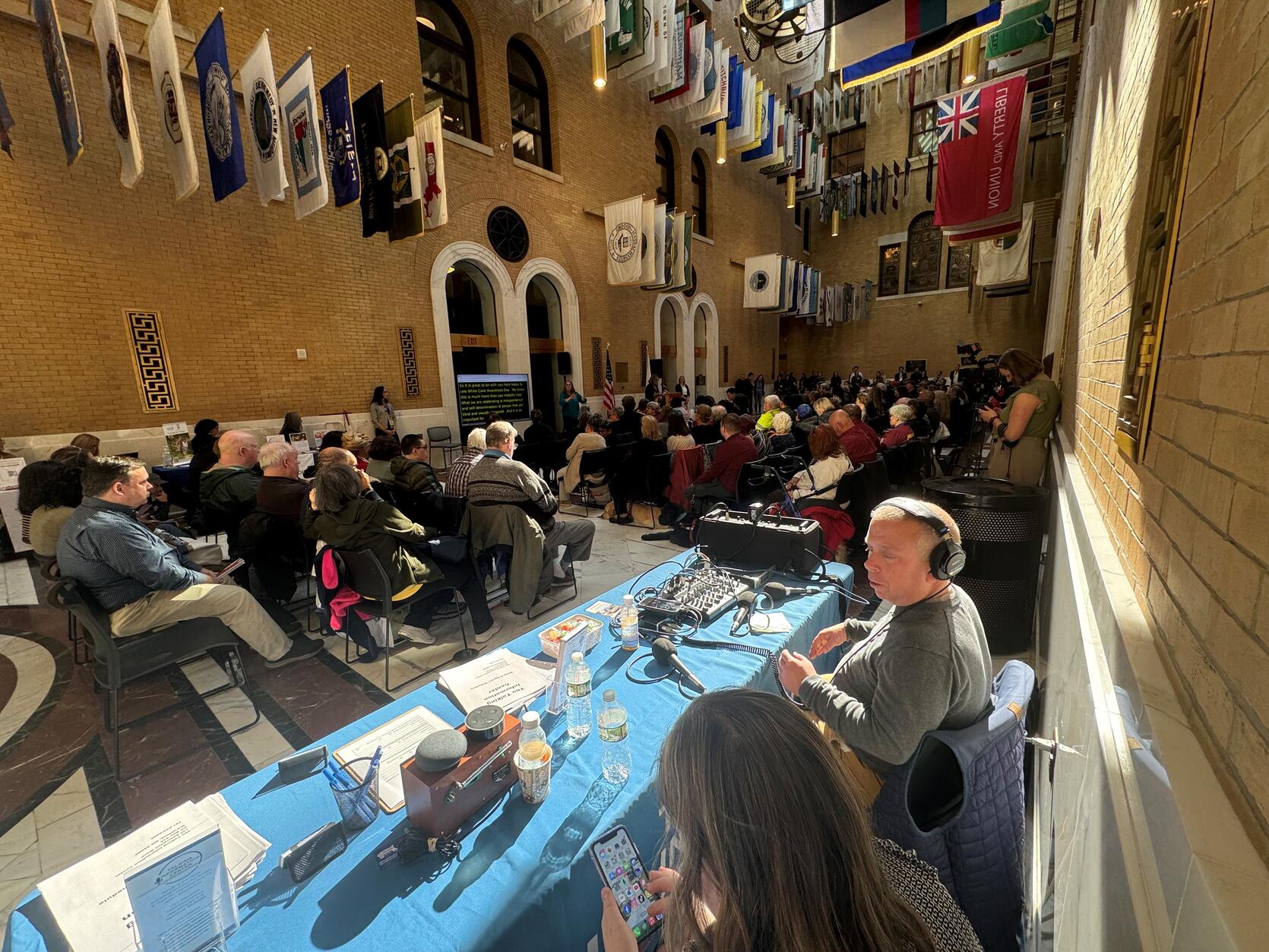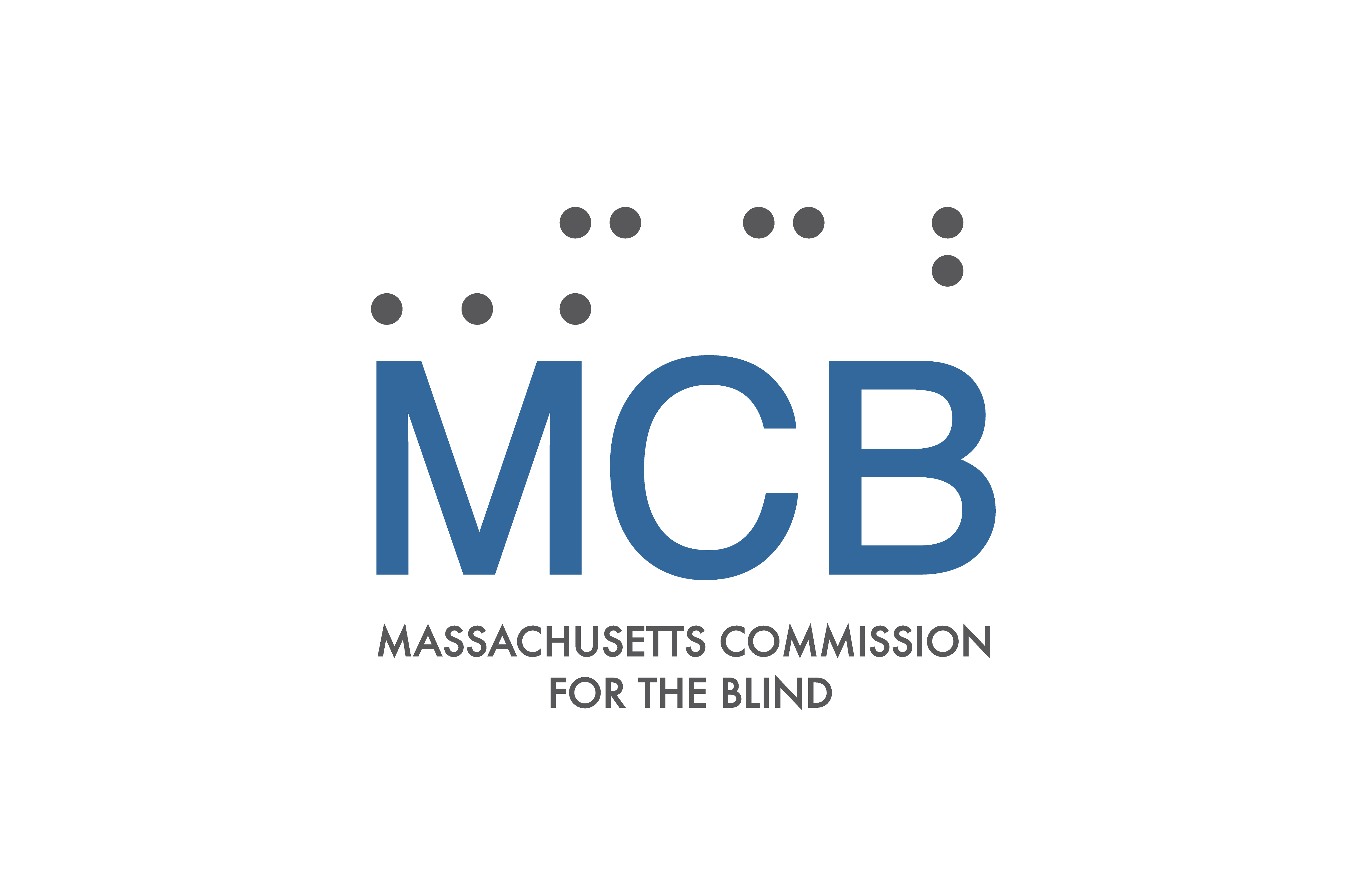- Massachusetts Commission for the Blind
Media Contact
Mike Saccone, Director of Communications

BOSTON — BOSTON — Today, The Massachusetts Commission for the Blind (MCB) and Perkins School for the Blind welcomed hundreds of people to the Massachusetts State House to celebrate White Cane Awareness Day, a special observance dedicated to highlighting the mobility, independence, and achievements of people who are legally blind or have low vision. The event featured MCB Commissioner John Oliveira, Health and Human Services Secretary Kate Walsh, Senator Robyn Kennedy, and MBTA General Manager and CEO Phillip Eng. Attendees at the event could find resources from a dozen organizations that support people with vision loss.
This celebration follows the proclamation by Governor Maura Healey designating October 15, 2024, as White Cane Awareness Day in Massachusetts. For many with vision loss, travel aids like white canes and dog guides are essential for navigating public spaces. This observance aims to raise awareness of how simple actions, such as stopping for pedestrians using a white cane, can make a significant impact on public safety.
“The white cane is a symbol of independence, allowing individuals to navigate their surroundings with dignity and confidence,” said Governor Maura Healey. “Our administration is committed to making Massachusetts a leader in accessibility and inclusivity, ensuring every resident has the opportunity to live independently.”
“In Massachusetts, we celebrate the determination and resilience of those who use the white cane to pursue their goals and live independently,” said Lieutenant Governor Kimberley Driscoll. “Our administration is focused on creating inclusive, supportive communities that are free of barriers, so everyone, regardless of ability, can move safely and freely.”
“Today we celebrate the independence of people in Massachusetts who are blind or visually impaired,” said Health and Human Services Secretary Kate Walsh. “We are proud to offer resources and services that help people go about their daily lives with confidence and enable them to participate fully in their communities every day.”
“We are truly inspired by the incredible people who joined us today to celebrate White Cane Awareness Day,” said MCB Commissioner John Oliveira. “Their resilience and determination remind us why breaking down barriers is so vital. We are committed to ensuring every resident who is legally blind has the tools, skills, and resources they need to live a purposeful life in a world still working toward full accessibility.”
Today’s ceremony also recognized veteran Boston Police Officer Robert Figueroa who was seriously injured in July while assisting a pedestrian who is legally blind across a busy intersection in the North End.
"We are grateful to the Massachusetts Commission for the Blind for honoring our officer for his service to our City and our Commonwealth,” said Boston Police Commissioner Michael A. Cox. “He sustained serious injuries that day and we are thankful that he and his family are able to take part in this ceremony to acknowledge his selfless dedication to others as a Boston Police Officer. We want our City to be accessible and safe, our officers support those living with cognitive and physical challenges in whatever ways we can."
As part of ongoing outreach efforts, MCB continues to raise awareness about the White Cane Law, which requires drivers to stop for pedestrians using a white cane or guide dog at street crossings. Violators can face fines of up to $500 for each offense.
Throughout October, the Massachusetts Department of Transportation is featuring White Cane Awareness Month billboards at nearly 200 locations across the state. The Massachusetts Registry of Motor Vehicles is also displaying a public service announcement on monitors at Service Centers.
“This month, we honor all individuals with vision loss who use the white cane to travel confidently - whether it's running daily errands or enjoying the outdoors," said Transportation Secretary and CEO Monica Tibbits-Nutt. “White Cane Awareness Month is a vital reminder to all drivers that pedestrians using a white cane have the right of way under state law.”
For more information about White Cane Awareness Day, the White Cane Law, and services available for Massachusetts residents who are legally blind, visit mass.gov/whitecane.
Statements of Support
Senator Robyn Kennedy, Co-Chair of the Joint Committee on Children, Families, and Persons with Disabilities:
“White Cane Awareness Day is more than just a celebration; it’s a powerful reminder of the independence, strength, and resilience of individuals who are blind or have low vision. The white cane is a symbol of empowerment, giving those who use it the ability to navigate our world with confidence and dignity. By raising awareness on this day, we shine a light on the importance of accessibility, mobility, and inclusivity for all. It’s a call to action for communities to come together, break down barriers, and create a society where everyone, regardless of their abilities, has the freedom to move, explore, and achieve their fullest potential.”
Representative Jay Livingstone, Co-Chair of the Joint Committee on Children, Families, and Persons with Disabilities:
“As Co-Chair of the Joint Committee on Children, Families, and Persons with Disabilities, I’m honored to take part in White Cane Awareness Day. This event is a wonderful opportunity to celebrate the achievements of members of our community who are blind or have low vision.”
Casandra Xavier, Disability Policy Consortium Representative, Riders' Transportation Access Group (RTAG) Executive Board:
"My white cane is my tool for navigation and independence. It is the most helpful tool I’ve ever had in the past 10+ years. Thanks to my mobility instructor, I now know how to use my white cane better than ever."
Cynthia Canham, Interim Director, Massachusetts Association for the Blind and Visually Impaired (MABVI):
“MABVI primarily supports older adults with age-onset blindness or low vision. White canes are an essential tool for some MABVI participants to live safe, satisfying, and independent lives. We invite adults with visual disabilities who live in the Commonwealth of Massachusetts to visit our website, call us at 888-613-2777, or email us to learn more about MABVI’s Orientation and Mobility and other support services.”
Jonathan LeJeune, Director, DeafBlind Community Access Network (DBCAN)
“White Cane Awareness Day highlights the freedom and self-reliance that the white cane provides. It's more than just a tool; it's a symbol of mobility, safety, and the right to navigate the world with confidence, allowing individuals with vision loss to access opportunities and to engage fully in society.”
Laura Brelsford, Assistant General Manager, MBTA Department of System-Wide Accessibility:
“At the MBTA, we are constantly working to make our services safer and more accessible for everyone. In order to do this, soliciting and integrating feedback from our riders and employees who are blind and/or low vision is critical. As such, we are happy to celebrate White Cane Awareness Day and our ongoing partnership with the Massachusetts Commission for the Blind.”
Kathleen A. Petkauskos, Senior Director, Workplace Equity and Inclusion, ForHealth Consulting at UMass Chan Medical School; Director, Work Without Limits:
“Every driver in Massachusetts must remember that the White Cane Law requires them to come to a full stop and remain stopped until a blind pedestrian has safely crossed the street. White Cane Awareness Day is crucial because it not only raises awareness of this important law but also highlights the personal courage and perseverance it takes to become a white cane user. It celebrates the confidence, independence, and success that follows. We commend the Massachusetts Commission for the Blind, Perkins School for the Blind, and the Healey-Driscoll Administration for recognizing White Cane Awareness Day and giving it the attention it deserves.”
Mary Mahon McCauley, Executive Director, Massachusetts Office on Disability:
“The White Cane represents independence and accessibility for thousands of Massachusetts residents who are blind or visually impaired, including myself. White Cane Awareness Day is an important reminder that we all have a responsibility to create safe, accessible communities.”
Ashley Bloom, Chief IT Accessibility Officer, Executive Office of Technology Services and Security:
“As a person with a visual impairment, the white cane empowers me to navigate physical environments safely and independently around the Commonwealth with confidence. I am proud to support White Cane Awareness Day and use my white cane to show that visual impairment is not a hindrance to full participation and access.”
Lisa DiBonaventura, Statewide Director for Vision and Vision Loss Services, Massachusetts Department of Developmental Services (DDS):
“White Cane Awareness Day celebrates the achievements of people with blindness or visual impairments, including individuals with intellectual or developmental disabilities, and the independence that use of the white cane brings! The day offers a fantastic opportunity to applaud the dedicated efforts of cane users, and to recognize Certified Orientation and Mobility Specialists (COMS) working with the Massachusetts Commission for the Blind (MCB)/ Massachusetts Department of Developmental Service (DDS) Partnership Project. COMS promote safe and independent travel by teaching the use of the white cane, the adaptive mobility device (AMD), and other orientation and mobility techniques. Congratulations to all who proudly use their white cane or AMD, are sharing their personal stories, and to the recipients of the Meg Robertson Mobility Award. Your hard work and generosity of spirit inspire us all and serve as a powerful reminder of the importance of collaboration, accessibility, and inclusion for everyone.”
###
